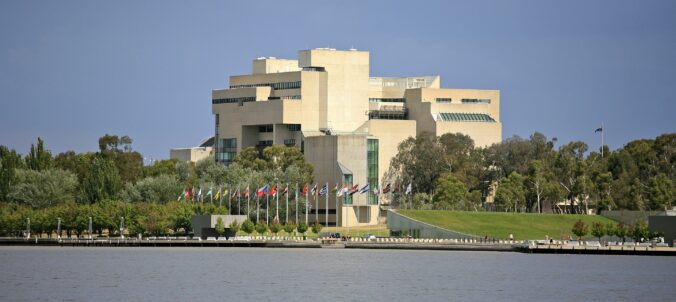Legal Realism and Australian Constitutional Law
— Jeremy Patrick, University of Southern Queensland
Introduction
It has become textbook wisdom that the High Court of Australia makes its decisions in an extremely technical and (for lack of a better word) ‘legalistic’ way.[1] This is true not only in areas of law where such a method of decision-making would seem natural, such as tax, but also in areas where it may seem surprising—such as constitutional law. A ‘strict and complete legalism’ (in Dixon CJ’s famous words)[2] means decisions should be made purely by neutral, objective application of legal principles. Anything else—policy considerations, personal views, broader ramifications, empathy for the persons affected, and so forth—must be excluded. Under a legalist model of judicial decision-making, judges are just like referees at a rugby match—they objectively determine whether a try has scored or not.
However, there is another theory of jurisprudence that presents a diametrically opposed explanation for how judges make decisions: legal realism. If legalism posits that judges apply rules to reach a result, legal realism says the opposite actually takes place, as judges first reach the result they like and then rhetorically justify those results by reference to rules. For appellate courts (like the High Court), legal realism argues that there is simply a nearly inexhaustible array of different rules, conventions, precedents, distinctions, discretions, and ambiguous standards (‘reasonable’ or ‘proportionate’) that allow for almost any outcome to be plausibly justified as ‘what the law requires’.
This is not to say that judges are cynical liars deceiving the public; judges acting in good faith with the very best of intentions will still find any of their pre-existing inclinations ‘validated’ by a review of the authorities—at least if they look hard enough.
Legal formalism or realism?
It is clear that there is a clash between irreconcilable theories of judicial decision-making. The legalistic, positivist view publicly embraced time and again by members of the High Court is that their decisions are based on rules: rules entrenched in the Constitution by the framers, rules proclaimed in statute by Parliament, and rules carefully crafted over decades by previous courts (precedent).
The critical realist view is that the ‘rules’ (and the ‘facts’ that they’re applied to) are so inherently manipulable that nearly any result can be announced and made to look plausible. Thus, a realist view of High Court decision-making would posit that other factors drive actual results. These factors might involve the personal moral and political views of the judges and their background characteristics, an implicit deference to public opinion, a reluctance to disturb established institutions and the status quo, and many more. At an abstract level, no resolution between the competing theories is possible unless one is shown to be logically self-contradictory—and neither has been.
Empirical study
However, the use of empirical data can be valuable in lending credence or doubt to an abstract theory. A recent research project conducted by the author tested the realist model of judicial decision-making by positing a particular non-rules-based factor that could drive decisions in constitutional cases.
Hypothesis
The hypothesis tested was whether a single factor (whether or not the Commonwealth is a party) was enough, standing alone, to reliably predict the outcome of a constitutional law case in Australia.
If the hypothesis was found to be validated, that could be an important indicator that the elaborate doctrinal structure of Australian constitutional law has little actual impact on decisions. Instead of ‘the rule of law’, the primary tenet of constitutional law could become ‘the Commonwealth (almost) always wins’.
On the other hand, if the hypothesis failed substantially, that could indicate that perhaps more weight should be given to the legalist view that neutral rules, objectively applied, determine outcomes.
Dataset
The research looked at all High Court cases from the years 2000 to 2020 (inclusive). Through a set of objective binary decisions, this set of cases was narrowed by excluding:
- Cases that did not have a constitutional element; and
- From what remained any cases in which the Commonwealth was not a party.
The final set of cases which involved constitutional law and which the Commonwealth was a party was then examined to decide whether the Commonwealth prevailed.
Results
The research finding was that the Commonwealth prevailed in 79 per cent of these cases.
If this finding is correct and validated with subsequent empirical research, the fact that the Commonwealth wins four out of every five constitutional cases requires explanation.
The results obviously are not the result of mere random chance, which could only exist if the outcome was closer to 50-50.
Potential explanations
Nonetheless, correlation is not causation, and multiple ways to account for the observed effect exist.
Lawyer quality
One initially plausible explanation for the disparity in results is that parties litigating against the Commonwealth are simply finding themselves out-lawyered by the expert lawyers and experienced advocates in the Solicitor-General’s office. However, State governments also maintain experienced experts in constitutional law, and the High Court bar in this area is a small but select group of ‘repeat player’ barristers.
Resources
Another explanation that might be proffered is that the Commonwealth has (quite literally) unmatchable financial resources for litigation—could it just be outlasting its adversaries? This explanation might make sense in some types of cases in other areas (such as environmental law), but constitutional law cases are generally decided on agreed statements of facts and by parties with sufficient resources to stay the course.
The Constitution
Perhaps the Commonwealth usually wins just because that’s how the Constitution was drafted? Although there were clear defects in the drafting of the Australian Constitution, it is clear that it was intended and structured to create a federal system in which the national government had a limited set of enumerated powers—the dramatic growth of Commonwealth legislative and executive power at the expense of the states over the past century was certainly not by design. Interpreting powers broadly and limitations narrowly was not an inevitable outcome but a deliberate choice by the High Court, and it is begging the question to explain that the Commonwealth usually wins High Court cases by stating that is due to the Commonwealth having usually won High Court cases.
Legal realism
A legal realist explanation for the empirical observation that the Commonwealth wins four out of every five constitutional law cases would likely centre around the most common characteristics of the members of the High Court. There is no national merits selection test to become a High Court justice; appointment is purely at the discretion of the Commonwealth executive.
Historically, and still today, most individuals appointed to the High Court are white, from upper middle-class backgrounds, attended a prestigious (usually private) high school in a capital city, attended a Group of Eight university, and then went onto a successful career in private legal practice for a well-connected law firm.[3] Not every member of the High Court has held each of these typical characteristics, of course, but enough have that the members tend to share a general worldview and set of personal values that are inevitably reflected in the decisions they reach.
The argument would be that High Court justices are, by virtue of their background and selection, establishmentarian institutionalists. They have found enormous personal and career success working within the establishment, believe they have reached their present position through merit, and are acculturated to a conservative institution known for its preservation of tradition and the status quo. High Court justices would probably not have been selected for the position if they were openly sceptical of the ever-expanding scope of Commonwealth legislative and executive power, repeatedly found against the Commonwealth as a lower court judge, or were perceived by the executive as a (potentially hostile) ‘outsider’ to the system—whatever their ‘merit’ as a lawyer, legal scholar, or judge.
In essence, to become a High Court justice means having been well-liked and well-regarded within a particular system, with the unsurprising result that one usually supports that system against constitutional attack from outside. Building on the legalist analogy, if judges are mere referees, they are referees chosen solely at the discretion of a single team in the league, and we perhaps therefore should not be surprised that their on-the-field rulings tend to favour that team.
Implications
If legal realism as an explanatory theory better explains and predicts High Court decision-making in constitutional cases, this has major implications for how we teach about the constitution in law schools, how we advise clients on the likelihood of success or failure in contemplated claims, and how we theorise the importance (or lack thereof) of the elaborate doctrinal framework of constitutional law. Perhaps, if nothing else, we should learn that understanding the formal rules of the game may be of little benefit in predicting who will ultimately win it.
This post contained extracts from the full version of Jeremy’s research, which can be found on the Social Science Research Network.
Read more: Legal Realism and Australian Constitutional Law (SSRN)
[1] See, eg, George Williams et al, Blackshield and Williams Australian Constitutional Law and Theory: Commentary and Materials (Federation Press, 7th ed, 2018) 170 (describing the ‘triumph of legalism’ in High Court jurisprudence ever since the Engineers’ Case).
[2] Owen Dixon, ‘Address upon taking the oath of office in Sydney as Chief Justice of the High Court of Australia on 21st April’ (1952) 85 CLR xi.
[3] See, eg, Harry Hobbs, ‘Finding a Fair Reflection on the High Court of Australia’ (2015) 40(1) Alternative Law Journal 13.






Recent Comments